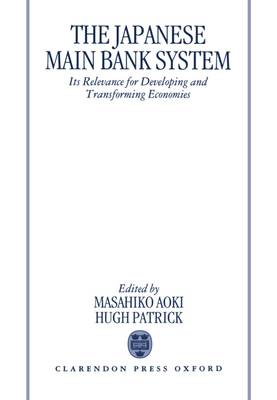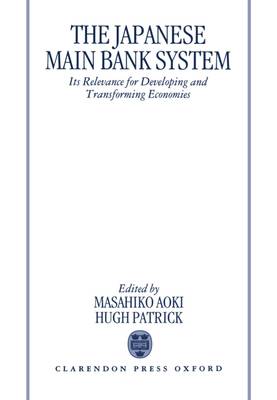
- Afhalen na 1 uur in een winkel met voorraad
- Gratis thuislevering in België vanaf € 30
- Ruim aanbod met 7 miljoen producten
- Afhalen na 1 uur in een winkel met voorraad
- Gratis thuislevering in België vanaf € 30
- Ruim aanbod met 7 miljoen producten
Zoeken
The Japanese Main Bank System
Its Relevance for Developing and Transforming Economies
Masahiko Aoki
Hardcover | Engels
€ 410,95
+ 821 punten
Omschrijving
A thorough empirical and theoretical analysis of the Japanese main bank system, this book also examines the relevance of the system as a model for developing market economies and transforming socialist economies the world over. The basic characteristics of the main bank system are examined here: its roots, development, and role in the heyday of its rapid growth, as well as its performance, strengths and weaknesses. The work goes on to look at how the system has changed over the last two decades. The contributors conclude that banking-based systems are in most cases the most appropriate for industrial financing until a relatively late stage of a country's economic and financial development. Incorporating the results of a major World Bank research program, the volume brings together some of the best scholars in the field and will be of interest to specialists in Japanese studies and those with a general interest in systems of finance.
Specificaties
Betrokkenen
- Auteur(s):
- Uitgeverij:
Inhoud
- Aantal bladzijden:
- 684
- Taal:
- Engels
Eigenschappen
- Productcode (EAN):
- 9780198288992
- Verschijningsdatum:
- 13/04/1995
- Uitvoering:
- Hardcover
- Formaat:
- Genaaid
- Afmetingen:
- 163 mm x 235 mm
- Gewicht:
- 1202 g

Alleen bij Standaard Boekhandel
+ 821 punten op je klantenkaart van Standaard Boekhandel
Beoordelingen
We publiceren alleen reviews die voldoen aan de voorwaarden voor reviews. Bekijk onze voorwaarden voor reviews.







